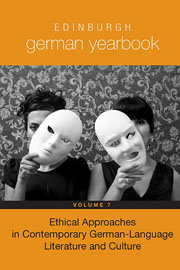 Edinburgh German Yearbook 7
Edinburgh German Yearbook 7 Book contents
- Frontmatter
- Contents
- Introduction: Ethical Approaches in Contemporary German-Language Literature and Culture
- “The Absoluteness of the Knowledge Once Possessed”: 1968 Ethics and Consensual Ethics in Uwe Timm's Novel Rot
- What the World Needs Now: Rancière, Ethology, and Christian Petzold's Toter Mann (2001) and Wolfsburg (2003)
- Materiality and Ethics in Recent German Prose Narratives by Angelika Overath and Angela Krauß
- Shameful Stories: The Ethics of East German Memory Contests in Fiction by Julia Schoch, Stefan Moster, Antje Rávic Strubel, and Judith Schalansky
- Affective Encounters and Ethical Responses in Robert Schneider's Die Luftgängerin and Sybille Berg's Vielen Dank für das Leben
- Narrative Ethics and the Problems of Age and Aging in Annette Pehnt's Haus der Schildkröten
- “So ähnlich könnte es gewesen sein, aber […]”: Unethical Narrations of Emily Ruete's “Große Wandlungen”
- Enlightenment Fundamentalism: Zafer Şenocak, Navid Kermani, and Multiculturalism in Germany Today
- Voicing Rupture: Ethical Concerns in Short Prose and Lyric Texts by Yoko Tawada
What the World Needs Now: Rancière, Ethology, and Christian Petzold's Toter Mann (2001) and Wolfsburg (2003)
Published online by Cambridge University Press: 05 December 2013
- Frontmatter
- Contents
- Introduction: Ethical Approaches in Contemporary German-Language Literature and Culture
- “The Absoluteness of the Knowledge Once Possessed”: 1968 Ethics and Consensual Ethics in Uwe Timm's Novel Rot
- What the World Needs Now: Rancière, Ethology, and Christian Petzold's Toter Mann (2001) and Wolfsburg (2003)
- Materiality and Ethics in Recent German Prose Narratives by Angelika Overath and Angela Krauß
- Shameful Stories: The Ethics of East German Memory Contests in Fiction by Julia Schoch, Stefan Moster, Antje Rávic Strubel, and Judith Schalansky
- Affective Encounters and Ethical Responses in Robert Schneider's Die Luftgängerin and Sybille Berg's Vielen Dank für das Leben
- Narrative Ethics and the Problems of Age and Aging in Annette Pehnt's Haus der Schildkröten
- “So ähnlich könnte es gewesen sein, aber […]”: Unethical Narrations of Emily Ruete's “Große Wandlungen”
- Enlightenment Fundamentalism: Zafer Şenocak, Navid Kermani, and Multiculturalism in Germany Today
- Voicing Rupture: Ethical Concerns in Short Prose and Lyric Texts by Yoko Tawada
Summary
Moral ist immer das, worum es im Kino geht,
aber die Filme selbst sollten nicht moralische
Positionen untermalen und propagieren, sondern
darstellen, so wie sie in den Menschen existiert
und in den Systemen, denen sie folgen.
—Christian PetzoldThe Ethical Turn
As Thomas Elsaesser has argued recently, European cinema since the end of the Cold War foregrounds ethical, rather than directly political, concerns. For Elsaesser, who refers to a body of work that ranges from Fatih Akin to Michael Winterbottom, from Dogville to the Dardennes Brothers, this is a cinema that largely foregoes offering political solutions to the tensions its central characters experience. Even on the occasions when its focus expands beyond the personal narratives of the protagonists, when its stories address “spaces to be redistributed, and power-relations to be re-negotiated,” it remains, for Elsaesser, primarily an ethical rather than a political cinema. Elsaesser argues that many recent films address a radical encounter with the other, an event that brings with it the risks of violence and of a process of destabilization, yet also opens up the possibility of a genuinely new social awareness.
Elsaesser's account of contemporary cinema rests on categories proposed by the French philosopher Jacques Rancière. Rancière's work has been taken up recently across a number of disciplines, from political philosophy to literary and film studies. Rancière's work is of particular significance for an analysis of the contested areas of contemporary thought where questions of politics, ethics, and aesthetics merge.
- Type
- Chapter
- Information
- Edinburgh German Yearbook 7Ethical Approaches in Contemporary German-Language Literature and Culture, pp. 29 - 46Publisher: Boydell & BrewerPrint publication year: 2013


